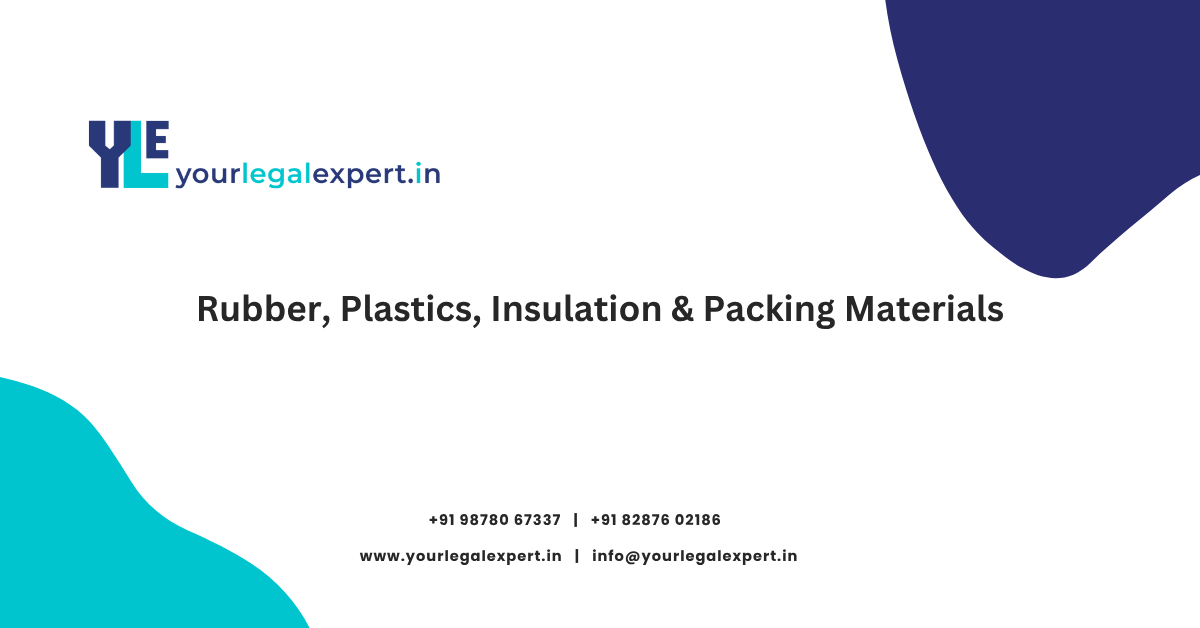#Introduction
Trademark Class 17 under the NICE Classification system includes rubber, gutta-percha, gum, asbestos, mica, and products made from these materials, as well as insulating, packing, and sealing materials.
If your business manufactures or supplies rubber products, plastic goods, insulation materials, or sealing products, your trademark belongs in Class 17.
This class is especially important for industries in automotive, construction, electronics, packaging, and industrial manufacturing.
#🧾 Detailed List of Goods Covered under Class 17
A. Rubber & Rubber-Based Products
Unprocessed and semi-processed rubber
Natural and synthetic rubber compounds
Rubber sheets, rods, and tubes
Vulcanized rubber and latex (non-medical use)
Rubber stoppers, plugs, and seals
Rubber hoses, belts, and mats
Rubber sleeves and gaskets for sealing or insulating
Rubber adhesives and bonding compounds (non-industrial)
Rubber tiles and flooring (industrial use)
B. Plastics & Plastic Materials
Unprocessed and semi-processed plastics in sheet, rod, or film form
Plastic films for industrial or packaging use (non-wrapping)
PVC, nylon, acrylic, and Teflon sheets
Plastic seals, rods, and tubes
Extruded plastics for manufacturing and insulation
Plastic adhesives and fillers for industrial use
C. Insulating Materials
Insulation materials for electricity, heat, and sound
Thermal and acoustic insulation boards
Foam insulation and rubber foam sheets
Electrical insulators and dielectric materials
Fiberglass insulation products
Waterproofing and anti-condensation materials
Insulating coatings and wraps for wires, pipes, and machinery
Soundproofing and vibration-dampening materials
D. Packing, Sealing & Stopping Materials
Packing, sealing, and insulating tapes
Industrial gaskets, O-rings, and seals
Non-metallic flexible pipes, hoses, and tubes
Rubber or plastic stoppers and bungs
Caulking compounds and mastic sealants
Self-adhesive sealing strips and insulation foams
Joint sealants for construction and mechanical use
E. Flexible Pipes & Tubing (Non-Metallic)
Flexible hoses and tubing made of rubber or plastic
Garden hoses and industrial transfer hoses
Conduits for electrical cables (non-metallic)
Non-metallic fittings for flexible pipes
F. Miscellaneous Industrial Materials
Microporous and expanded rubber sheets
Synthetic resins (semi-processed)
Rubber compounds used in tires, footwear, and seals
Industrial sleeves, spacers, and buffers made of rubber or plastic
Waterproof membranes and linings
Adhesive plastic films for use in manufacturing
Rubber or plastic insulating gloves (industrial use)
#🚫 What’s Not Included in Class 17
Unprocessed artificial resins → Class 01
Finished plastic household goods → Class 21
Rubber footwear → Class 25
Building materials (non-insulating) → Class 19
Medical gloves and latex items → Class 10
Adhesives for stationery → Class 16
Packaging materials made of paper → Class 16
#💡 Practical Tips for Trademark Applicants
Use comprehensive wording like:
“Rubber, gutta-percha, gum, asbestos, mica, and goods made from these materials; plastics in extruded form for use in manufacture; packing, stopping, and insulating materials; flexible pipes, not of metal.”If your company manufactures industrial insulation or rubber seals, explicitly include both.
For plastic-based packaging (industrial), mention “plastic films for industrial use” — not for household wrapping.
Avoid including final consumer goods like containers or shoes; this class is for raw and semi-finished materials.
Businesses in automotive, HVAC, or electronics should also include insulation materials relevant to their sector.
#🧠 Summary
Trademark Class 17 includes rubber, plastics, insulation, and sealing materials used in manufacturing, construction, and industrial applications.
It’s the perfect class for companies producing semi-finished materials like rubber sheets, gaskets, hoses, plastic films, and insulation boards.
If your brand deals in industrial materials rather than finished consumer products, you should register under Class 17.
#❓ Frequently Asked Questions (FAQs)
Q1. What does Trademark Class 17 cover?
It includes rubber, plastics, insulation, packing, and sealing materials used in industrial or construction applications.
Q2. Are plastic sheets included?
Yes, unprocessed or semi-processed plastic sheets, rods, and films fall under Class 17.
Q3. Are rubber hoses and pipes part of this class?
Yes, flexible, non-metallic hoses and tubes made of rubber or plastic are included.
Q4. Are adhesives included in Class 17?
Only industrial or rubber-based adhesives — not stationery or medical ones.
Q5. Are insulation materials for buildings included?
Yes, thermal, sound, and waterproofing insulation materials are included here.
Q6. Are packaging materials made of paper part of this class?
No, paper packaging belongs to Class 16.
Q7. Are rubber gloves included?
Only industrial or insulating gloves — medical gloves fall under Class 10.


 – Sacred Instrument for Puja & Aarti Rituals.png)
 – Sacred Bell for Aarti & Religious Ceremonies.png)